Coronavirus vaccines: largest study yet confirms Pfizer-BioNTech’s ‘95 per cent protection’ after second shot
- Two doses offered 95.3 per cent protection against infection, 96.7 protection against death seven days after second dose
- Early data from separate Moderna study shows its booster increases antibodies against Covid-19 variants

The largest real-world study yet of the Pfizer-BioNTech vaccine on Thursday confirmed that the jab provided more than 95 per cent protection against Covid-19, but found that the level dropped significantly when people received just one of the two prescribed doses.
The authors of the research from Israel’s national vaccination campaign said it showed real-world proof that the pandemic could be ended by rapid, global vaccination programmes.
An analysis of public health data from Israel – one of the countries with the highest proportion of fully-vaccinated adults – showed the vaccine was extremely effective in protecting even elderly individuals at a time when the more infectious English variant was dominant, according to the results published in The Lancet medical journal.
By the start of April, nearly 5 million people in Israel had received two doses of the Pfizer-BioNTech jab, more than 70 per cent of the population.
The study found that two doses conveyed 95.3 per cent protection against infection and 96.7 per cent protection against death seven days after the second dose.
After 14 days, that protection increased to 96.5 per cent and 98 per cent, respectively.